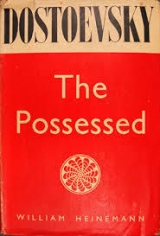
Текст книги "The Possessed"
Автор книги: Федор Достоевский
сообщить о нарушении
Текущая страница: 38 (всего у книги 49 страниц)
“It's all incendiarism! It's nihilism! If anything is burning, it's nihilism!” I heard almost with horror; and though there was nothing to be surprised at, yet actual madness, when one sees it, always gives one a shock.
“Your Excellency,” said a policeman, coming up to him, “what if you were to try the repose of home? . . . It's dangerous for your Excellency even to stand here.”
This policeman, as I heard afterwards, had been told off by the chief of police to watch over Andrey Antonovitch, to do his utmost to get him home, and in case of danger even to use force – a task evidently beyond the man's power.
“They will wipe away the tears of the people whose houses have been burnt, but they will burn down the town. It's all the work of four scoundrels, four and a half! Arrest the scoundrel! He worms himself into the honour of families. They made use of the governesses to burn down the houses. It's vile, vile! Aie, what's he about?” he shouted, suddenly noticing a fireman at the top of the burning lodge, under whom the roof had almost burnt away and round whom the flames were beginning to flare up. “Pull him down! Pull him down! He will fall, he will catch fire, put him out! . . . What is he doing there?”
“He is putting the fire out, your Excellency.”
“Not likely. The fire is in the minds of men and not in the roofs of houses. Pull him down and give it up! Better give it up, much better! Let it put itself out. Aie, who is crying now? An old woman! It's an old woman shouting. Why have they forgotten the old woman?”
There actually was an old woman crying on the ground floor of the burning lodge. She was an old creature of eighty, a relation of the shopkeeper who owned the house. But she had not been forgotten; she had gone back to the burning house while it was still possible, with the insane idea of rescuing her feather bed from a corner room which was still untouched. Choking with the smoke and screaming with the heat, for the room was on fire by the time she reached it, she was still trying with her decrepit hands to squeeze her feather bed through a broken window pane. Lembke rushed to her assistance. Every one saw him run up to the window, catch hold of one corner of the feather bed and try with all his might to pull it out. As ill luck would have it, a board fell at that moment from the roof and hit the unhappy governor. It did not kill him, it merely grazed him on the neck as it fell, but Audrey Antonovitch's career was over, among us at least; the blow knocked him off his feet and he sank on the ground unconscious.
The day dawned at last, gloomy and sullen. The fire was abating; the wind was followed by a sudden calm, and then a fine drizzling rain fell. I was by that time in another part, some distance from where Lembke had fallen, and here I overheard very strange conversations in the crowd. A strange fact had come to light. On the very outskirts of the quarter, on a piece of waste land beyond the kitchen gardens, not less than fifty paces from any other buildings, there stood a little wooden house which had only lately been built, and this solitary house had been on fire at the very beginning, almost before any other. Even had it burnt down, it was so far from other houses that no other building in the town could have caught fire from it, and, vice versa,if the whole riverside had been burnt to the ground, that house might have remained intact, whatever the wind had been. It followed that it had caught fire separately and independently and therefore not accidentally. But the chief point was that it was not burnt to the ground, and at daybreak strange things were discovered within it. The owner of this new house, who lived in the neighbourhood, rushed up as soon as he saw it in flames and with the help of his neighbours Pulled apart a pile of faggots which had been heaped up by the side wall and set fire to. In this way he saved the house. But there were lodgers in the house – the captain, who was well known in the town, his sister, and their elderly servant, and these three persons – the captain, his sister, and their servant – had been murdered and apparently robbed in the night. (It was here that the chief of police had gone while Lembke was rescuing the feather bed.)
By morning the news had spread and an immense crowd of all classes, even the riverside people who had been burnt out had flocked to the waste land where the new house stood. It was difficult to get there, so dense was the crowd. I was told at once that the captain had been found lying dressed on the bench with his throat cut, and that he must have been dead drunk when he was killed, so that he had felt nothing, and he had “bled like a bull”; that his sister Marya Timofeyevna had been “stabbed all over” with a knife and she was lying on the floor in the doorway, so that probably she had been awake and had fought and struggled with the murderer. The servant, who had also probably been awake, had her skull broken. The owner of the house said that the captain had come to see him the morning before, and that in his drunken bragging he had shown him a lot of money, as much as two hundred roubles. The captain's shabby old green pocket-book was found empty on the floor, but Marya Timofeyevna's box had not been touched, and the silver setting of the ikon had not been removed either; the captain's clothes, too, had not been disturbed. It was evident that the thief had been in a hurry and was a man familiar with the captain's circumstances, who had come only for money and knew where it was kept. If the owner of the house had not run up at that moment the burning faggot stack would certainly have set fire to the house and “it would have been difficult to find out from the charred corpses how they had died.”
So the story was told. One other fact was added: that the person who had taken this house for the Lebyadkins was no other than Mr. Stavrogin, Nikolay Vsyevolodovitch, the son of Varvara Petrovna. He had come himself to take it and had had much ado to persuade the owner to let it, as the latter had intended to use it as a tavern; but Nikolay Vsyevolodovitch was ready to give any rent he asked and had paid for six months in advance.
“The fire wasn't an accident,” I heard said in the crowd.
But the majority said nothing. People's faces were sullen, but I did not see signs of much much indignation. People persisted, however, in gossiping about Stavrogin, saying that the murdered woman was his wife; that on the previous day he had “dishonourably” abducted a young lady belonging to the best family in the place, the daughter of Madame Drozdov, and that a complaint was to be lodged against him in Petersburg; and that his wife had been murdered evidently that he might marry the young lady. Skvoreshniki was not more than a mile and a half away, and I remember I wondered whether I should not let them know the position of affairs. I did not notice, however, that there was anyone egging the crowd on and I don't want to accuse people falsely, though I did see and recognised at once in the crowd at the fire two or three of the rowdy lot I had seen in the refreshment-room. I particularly remember one thin, tall fellow, a cabinet-maker, as I found out later, with an emaciated face and a curly head, black as though grimed with soot. He was not drunk, but in contrast to the gloomy passivity of the crowd seemed beside himself with excitement. He kept addressing the people, though I don't remember his words; nothing coherent that he said was longer than “I say, lads, what do you say to this? Are things to go on like this?” and so saying he waved his arms.
Last updated on Wed Jan 12 09:26:22 2011 for eBooks@Adelaide.
The Possessed, by Fyodor Dostoyevsky
Chapter III. A Romance Ended
FROM THE LARGE BALLROOM of Skvoreshniki (the room in which the last interview with Varvara Petrovna and Stepan Trofimovitch had taken place) the fire could be plainly seen At daybreak, soon after five in the morning, Liza was standing at the farthest window on the right looking intently at the fading glow. She was alone in the room. She was wearing the dress she had worn the day before at the matinee – a very smart light green dress covered with lace, but crushed and put on carelessly and with haste. Suddenly noticing that some of the hooks were undone in front she flushed, hurriedly set it right, snatched up from a chair the red shawl she had flung down when she came in the day before, and put it round her neck. Some locks of her luxuriant hair had come loose and showed below the shawl on her right shoulder. Her face looked weary and careworn. but her eyes glowed under her frowning brows. She went up to the window again and pressed her burning forehead against the cold pane. The door opened and Nikolay Vsyevolodovitch came in.
“I've sent a messenger on horseback,” he said. “In ten minutes we shall hear all about it, meantime the servants say that part of the riverside quarter has been burnt down, on the right side of the bridge near the quay. It's been burning since eleven o'clock; now the fire is going down.”
He did not go near the window, but stood three steps behind her; she did not turn towards him.
“It ought to have been light an hour ago by the calendar, and it's still almost night,” she said irritably.
“'Calendars always tell lies,'” he observed with a polite smile, but, a little ashamed; he made haste to add: “It's dull to live by the calendar, Liza.”
And he relapsed into silence, vexed at the ineptitude of the second sentence. Liza gave a wry smile.
“You are in such a melancholy mood that you cannot even find words to speak to me. But you need not trouble, there's a point in what you said. I always live by the calendar. Every step I take is regulated by the calendar. Does that surprise you?”
She turned quickly from the window and sat down in a low chair.
“You sit down, too, please. We haven't long to be together and I want to say anything I like. . . . Why shouldn't you, too, say anything you like?”
Nikolay Vsyevolodovitch sat beside her and softly, almost timidly took her hand.
“What's the meaning of this tone, Liza? Where has it suddenly sprung from? What do you mean by 'we haven't long to be together'? That's the second mysterious phrase since you waked, half an hour ago.”
“You are beginning to reckon up my mysterious phrases!” she laughed. “Do you remember I told you I was a dead woman when I came in yesterday? That you thought fit to forget. To forget or not to notice.”
“I don't remember, Liza. Why dead? You must live.”
“And is that all? You've quite lost your flow of words. I've lived my hour and that's enough. Do you remember Christopher Ivanovitch?”
“No I don't,” he answered, frowning.
“Christopher Ivanovitch at Lausanne? He bored you dreadfully. He always used to open the door and say,' I've come for one minute,' and then stay the whole day. I don't want to be like Christopher Ivanovitch and stay the whole day.” A look of pain came into his face.
“Liza, it grieves me, this unnatural language. This affectation must hurt you, too. What's it for? What's the object of it?”
His eyes glowed.
“Liza,” he cried, “I swear I love you now more than yesterday when you came to me!”
“What a strange declaration! Why bring in yesterday and to-day and these comparisons?”
“You won't leave me,” he went on, almost with despair; “we will go away together, to-day, won't we? Won't we?”
“Aie, don't squeeze my hand so painfully! Where could we go together to-day? To 'rise again' somewhere? No, we've made experiments enough . . . and it's too slow for me; and I am not fit for it; it's too exalted for me. If we are to go, let it be to Moscow, to pay visits and entertain – that's my ideal you know; even in Switzerland I didn't disguise from you what I was like. As we can't go to Moscow and pay visits since you are married, it's no use talking of that.”
“Liza! What happened yesterday!”
“What happened is over!”
“That's impossible! That's cruel?”
“What if it is cruel? You must bear it if it is cruel.”
“You are avenging yourself on me for yesterday's caprice,” he muttered with an angry smile. Liza flushed.
“What a mean thought!”
“Why then did you bestow on me ... so great a happiness? Have I the right to know?”
“No, you must manage without rights; don't aggravate the meanness of your supposition by stupidity. You are not lucky to-day. By the way, you surely can't be afraid of public opinion and that you will be blamed for this 'great happiness'? If that's it, for God's sake don't alarm yourself. It's not your doing at all and you are not responsible to anyone. When I opened your door yesterday, you didn't even know who was coming in. It was simply my caprice, as you expressed it just now, and nothing more! You can look every one in the face boldly and triumphantly!”
“Your words, that laugh, have been making me feel cold with horror for the last hour. That 'happiness' of which you speak frantically is worth . . . everything to me. How can I lose you now? I swear I loved you less yesterday. Why are you taking everything from me to-day? Do you know what it has cost me, this new hope? I've paid for it with life.”
“Your own life or another's?” He got up quickly.
“What does that mean?” he brought out, looking at her steadily.
“Have you paid for it with your life or with mine? is what I mean. Or have you lost all power of understanding?” cried Liza, flushing. “Why did you start up so suddenly? Why do you stare at me with such a look? You frighten me? What is it you are afraid of all the time? I noticed some time ago that you were afraid and you are now, this very minute . . . Good heavens, how pale you are!”
“If you know anything, Liza, I swear I don't . . . and I wasn't talking of thatjust now when I said that I had paid for it with life. . . .”
“I don't understand you,” she brought out, faltering apprehensively.
At last a slow brooding smile came on to his lips. He slowly sat down, put his elbows on his knees, and covered his face with his hands.
“A bad dream and delirium. . . . We were talking of two different things.”
“I don't know what you were talking about. . . . Do you mean to say you did not know yesterday that I should leave you to-day, did you know or not? Don't tell a lie, did you or not?”
“I did,” he said softly.
“Well then, “what would you have? You knew and yet you accepted 'that moment' for yourself. Aren't we quits?”
“Tell me the whole truth,” he cried in intense distress. “When you opened my door yesterday, did you know yourself that it was only for one hour?”
She looked at him with hatred.
“Really, the most sensible person can ask most amazing questions. And why are you so uneasy? Can it be vanity that a woman should leave you first instead of your leaving her? Do you know, Nikolay Vsyevolodovitch, since I've been with you I've discovered that you are very generous to me, and it's just that I can't endure from you.”
He got up from his seat and took a few steps about the room.
“Very well, perhaps it was bound to end so. ... But how can it all have happened?”
“That's a question to worry about! Especially as you know the answer yourself perfectly well, and understand it better than anyone on earth, and were counting on it yourself. I am a young lady, my heart has been trained on the opera, that's how it all began, that's the solution.”
“No.”
“There is nothing in it to fret your vanity. It is all the absolute truth. It began with a fine moment which was too much for me to bear. The day before yesterday, when I “insulted” you before every one and you answered me so chivalrously, I went home and guessed at once that you were running away from me because you were married, and not from contempt for me which, as a fashionable young lady, I dreaded more than anything. I understood that it was for my sake, for me, mad as I was, that you ran away. You see how I appreciate your generosity. Then Pyotr Stepanovitch skipped up to me and explained it all to me at once. He revealed to me that you were dominated by a 'great idea,' before which he and I were as nothing, but yet that I was a stumbling-block in your path. He brought himself in, he insisted that we three should work together, and said the most fantastic things about a boat and about maple-wood oars out of some Russian song. I complimented him and told him he was a poet, which he swallowed as the real thing. And as apart from him I had known long before that I had not the strength to do anything for long, I made up my mind on the spot. Well, that's all and quite enough, and please let us have no more explanations. We might quarrel. Don't be afraid of anyone, I take it all on myself. I am horrid and capricious, I was fascinated by that operatic boat, I am a young lady . . . but you know I did think that you were dreadfully in love with me. Don't despise the poor fool, and don't laugh at the tear that dropped just now. I am awfully given to crying with self-pity. Come, that's enough, that's enough. I am no good for anything and you are no good for anything; it's as bad for both of us, so let's comfort ourselves with that. Anyway, it eases our vanity.”
“Dream and delirium,” cried Stavrogin, wringing his hands, and pacing about the room. “Liza, poor child, what have you done to yourself?”
“I've burnt myself in a candle, nothing more. Surely you are not crying, too? You should show less feeling and better breeding. ...”
“Why, why did you come to me?”
“Don't you understand what a ludicrous position you put yourself in in the eyes of the world by asking such questions?”
“Why have you ruined yourself, so grotesquely and so stupidly, and what's to be done now?”
“And this is Stavrogin, 'the vampire Stavrogin,' as you are called by a lady here who is in love with you! Listen! I have told you already, I've put all my life into one hour and I am at peace. Do the same with yours . . . though you've no need to: you have plenty of 'hours' and 'moments' of all sorts before you.”
“As many as you; I give you my solemn word, not one hour more than you!”
He was still walking up and down and did not see the rapid penetrating glance she turned upon him, in which there seemed a dawning hope. But the light died away at the same moment.
“If you knew what it costs me that I can't be sincere at this moment, Liza, if I could only tell you ...”
“Tell me? You want to tell me something, to me? God save me from your secrets!” she broke in almost in terror. He stopped and waited uneasily.
“I ought to confess that ever since those days in Switzerland I have had a strong feeling that you have something awful, loathsome, some bloodshed on your conscience . . . and yet something that would make you look very ridiculous. Beware of telling me, if it's true: I shall laugh you to scorn. I shall laugh at you for the rest of your life. . . . Aie, you are turning pale again? I won't, I won't, I'll go at once.” She jumped up from her chair with a movement of disgust and contempt.
“Torture me, punish me, vent your spite on me,” he cried in despair. “You have the full right. I knew I did not love you and yet I ruined you! Yes, I accepted the moment for my own; I had a hope . . . I've had it a long time . . . my last hope. ... I could not resist the radiance that flooded my heart when you came in to me yesterday, of yourself, alone, of your own accord. I suddenly believed. . . . Perhaps I have faith in it still.”
“I will repay such noble frankness by being as frank. I don't want to be a Sister of Mercy for you. Perhaps I really may become a nurse unless I happen appropriately to die to-day; but if I do I won't be your nurse, though, of course, you need one as much as any crippled creature. I always fancied that you would take me to some place where there was a huge wicked spider, big as a man, and we should spend our lives looking at it and being afraid of it. That's how our love would spend itself. Appeal to Dashenka; she will go with you anywhere you like.”
“Can't you help thinking of her even now?”
“Poor little spaniel! Give her my greetings. Does she know that even in Switzerland you had fixed on her for your old age? What prudence! What foresight! Aie, who's that?”
At the farther end of the room a door opened a crack; a head was thrust in and vanished again hurriedly.
“Is that you, Alexey Yegorytch?” asked Stavrogin. “No, it's only I.” Pyotr Stepanovitch thrust himself half in again. “How do you do, Lizaveta Nikolaevna? Good morning, anyway. I guessed I should find you both in this room. I have come for one moment literally, Nikolay Vsyevolodovitch. I wag anxious to have a couple of words with you at all costs absolutely necessary . . . only a few words!”
Stavrogin moved towards him but turned back to Liza at the third step.
“If you hear anything directly, Liza, let me tell you I am to blame for it!”
She started and looked at him in dismay; but he hurriedly went out.
II
The room from which Pyotr Stepanovitch had peeped in was a large oval vestibule. Alexey Yegorytch had been sitting there before Pyotr Stepanovitch came in, but the latter sent him away. Stavrogin closed the door after him and stood expectant. Pyotr Stepanovitch looked rapidly and searchingly at him.”
“Well?”
“If you know already,” said Pyotr Stepanovitch hurriedly, his eyes looking as though they would dive into Stavrogin's soul, “then, of course, we are none of us to blame, above all not you, for it's such a concatenation . . . such a coincidence of events ... in brief, you can't be legally implicated and I've rushed here to tell you so beforehand.”
“Have they been burnt? murdered?”
“Murdered but not burnt, that's the trouble, but I give you my word of honour that it's not been my fault, however much you may suspect me, eh? Do you want the whole truth: you see the idea really did cross my mind – you hinted it yourself, not seriously, but teasing me (for, of course, you would not hint it seriously), but I couldn't bring myself to it, and wouldn't bring myself to it for anything, not for a hundred roubles – and what was there to be gained by it, I mean for me, for me. . . .” (He was in desperate haste and his talk was like the clacking of a rattle.) “But what a coincidence of circumstances: I gave that drunken fool Lebyadkin two hundred and thirty roubles of my own money (do you hear, my own money, there wasn't a rouble of yours and, what's more, you know it yourself) the day before yesterday, in the evening – do you hear, not yesterday after the matinee, but the day before yesterday, make a note of it: it's a very important coincidence for I did not know for certain at that time whether Lizaveta Nikolaevna would come to you or not; I gave my own money simply because you distinguished yourself by taking it into your head to betray your secret to every one. Well, I won't go into that . . . that's your affair . . . your chivalry . but I must own I was amazed, it was a knock-down blow. And forasmuch as I was exceeding weary of these tragic stories – and let me tell you, I talk seriously though I do use Biblical language – as it was all upsetting my plans in fact, I made up my mind at any cost, and without your knowledge, to pack the Lebyadkins off to Petersburg, especially as he was set on going himself. I made one mistake: I gave the money in your name;– was it a mistake or not? Perhaps it wasn't a mistake, eh? Listen now, listen how it has all turned out. . . .”
In the heat of his talk he went close up to Stavrogin and took hold of the revers of his coat (really, it may have been on purpose). With a violent movement Stavrogin struck him on the arm.
“Come, what is it ... give over . . . you'll break my arm, . . what matters is the way things have turned out,” he rattled on, not in the least surprised at the blow. “I forked out the money in the evening on condition that his sister and he should set off early next morning; I trusted that rascal Liputin with the job of getting them into the train and seeing them off. But that beast Liputin wanted to play his schoolboy pranks on the public – perhaps you heard? At the matinee? Listen, listen: they both got drunk, made up verses of which half are Liputin's; he rigged Lebyadkin out in a dress-coat, assuring me meanwhile that he had packed him off that morning, but he kept him shut somewhere in a back room, till he thrust him on the platform at the matinee. But Lebyadkin got drunk quickly and unexpectedly. Then came the scandalous scene you know of, and then they got him home more dead than alive, and Liputin niched away the two hundred roubles, leaving him only small change. But it appears unluckily that already that morning Lebyadkin had taken that two hundred roubles out of his pocket, boasted of it and shown it in undesirable quarters. And as that was just what Fedka was expecting, and as he had heard something at Kirillov's (do you remember, your hint?) he made up his mind to take advantage of it. That's the whole truth. I am glad, anyway, that Fedka did not find the money, the rascal was reckoning on a thousand, you know! He was in a hurry and seems to have been frightened by the fire himself. . . . Would you believe it, that fire came as a thunderbolt for me. Devil only knows what to make of it! It is taking things into their own hands. . . . You see, as I expect so much of you I will hide nothing from you: I've long been hatching this idea of a fire because it suits the national and popular taste; but I was keeping it for a critical moment, for that precious time when we should all rise up and . . . And they suddenly took it into their heads to do it, on their own initiative, without orders, now at the very moment when we ought to be lying low and keeping quiet! Such presumption! . . . The fact is, I've not got to the bottom of it yet, they talk about two Shpigulin men . but if there are any of ourfellows in it, if any one of them has had a hand in it – so much the worse for him! You see what comes of letting people get ever so little out of hand! No, this democratic rabble, with its quintets, is a poor foundation; what we want is one magnificent, despotic will, like an idol, resting on something fundamental and external. . . . Then the quintets will cringe into obedience and be obsequiously ready on occasion. But, anyway, though, they are all crying out now that Stavrogin wanted his wife to be burnt and that that's what caused the fire in the town, but ...”
“Why, are they all saying that?”
“Well, not yet, and I must confess I have heard nothing of the sort, but what one can do with people, especially when they've been burnt out! Vox populi vox Dei.A stupid rumour is soon set going. But you really have nothing to be afraid of. From the legal point of view you are all right, and with your conscience also. For you didn't want it done, did you? There's no clue, nothing but the coincidence. . . . The only thing is Fedka may remember what you said that night at Kirillov's (and what made you say it?) but that proves nothing and we shall stop Fedka's mouth. I shall stop it to-day. ...”
“And weren't the bodies burnt at all?”
“Not a bit; that ruffian could not manage anything properly. But I am glad, anyway, that you are so calm . . . for though you are not in any way to blame, even in thought, but all the same. . . . And you must admit that all this settles your difficulties capitally: you are suddenly free and a widower and can marry a charming girl this minute with a lot of money, who is already yours, into the bargain. See what can be done by crude, simple coincidence – eh?”
“Are you threatening me, you fool?”
“Come, leave off, leave off! Here you .are, calling me a fool, and what a tone to use! You ought to be glad, yet you ... I rushed here on purpose to let you know in good time. . . . Besides, how could I threaten you? As if I cared for what I could get by threats! I want you to help from goodwill and not from fear. You are the light and the sun. . . . It's I who am terribly afraid of you, not you of me! I am not Mavriky Nikolaevitch. . . . And only fancy, as I flew here in a racing droshky I saw Mavriky Nikolaevitch by the fence at the farthest corner of your garden ... in his greatcoat, drenched through, he must have been sitting there all night! Queer goings on! How mad people can be!”
“Mavriky Nikolaevitch? Is that true?”
“Yes, yes. He is sitting by the garden fence. About three hundred paces from here, I think. I made haste to pass him, but he saw me. Didn't you know? In that case I am glad I didn't forget to tell you. A man like that is more dangerous than anyone if he happens to have a revolver about him, and then the night, the sleet, or natural irritability – for after all he is in a nice position, ha ha! What do you think V Why is he sitting there?”
“He is waiting for Lizaveta Nikolaevna, of course.”
“Well! Why should she go out to him? And ... in such rain too . . . what a fool!”
“She is just going out to him!”
“Eh! That's a piece of news! So then . . . But listen, her position is completely changed now. What does she want with Mavriky now? You are free, a widower, and can marry her to-morrow? She doesn't know yet – leave it to me and I'll arrange it all for you. Where is she? We must relieve her mind too.”
“Relieve her mind?”
“Rather! Let's go.”
“And do you suppose she won't guess what those dead bodies mean?” said Stavrogin, screwing up his eyes in a peculiar way.
“Of course she won't,” said Pyotr Stepanovitch with all the confidence of a perfect simpleton, “for legally . . . Ech, what a man you are! What if she did guess? Women are so clever at shutting their eyes to such things, you don't understand women! Apart from it's being altogether to her interest to marry you now, because there's no denying she's disgraced herself; apart from that, I talked to her of 'the boat' and I saw that one could affect her by it, so that shows you what the girl is made of. Don't be uneasy, she will step over those dead bodies without turning a hair – especially as you are not to blame for them; not in the least, are you? She will only keep them in reserve to use them against you when you've been married two or three years. Every woman saves up something of the sort out of her husband's past when she gets married, but by that time . . . what may not happen in a year? Ha ha!”








